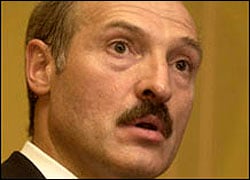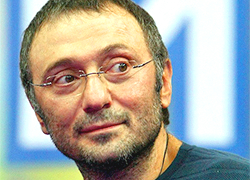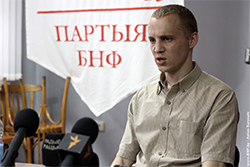
Lukashenka’s power is under a threat, and the European Union should not save Europe’s last dictator.
“I was released from one prison into another, a bigger one”, - a youth leader
Dzmitry Dashkievich said, having left the place of his imprisonment last week.
It
may seem that the number of political prisoners in Belarus has started
decreasing. However, political prisoners are not being released by the
order of the dictator, but because the terms of their imprisonments
expired. On 28 August Dzmitry Dashkievich was released,
Aliaksandr Frantskievich
was released in a few days after that. The freedom is very relative –
after the release they will be under police supervision and may be sent
to prison again any moment. This already happened with other
oppositionists.
It is important to remember that Dashkievich did
not simply spent his prison term in full, but was held in custody for a
year longer than the initial sentence for not recognizing himself guilty
and “bad behavior” behind bars. Like many other political prisoners, in
prison he underwent physical and psychological pressure and was kept in
inhuman conditions. Over ten political prisoners remain in Belarus in
such conditions, including a former presidential candidate
Mikalaj Statkievich and the leader of the human rights movement
Ales Bialiatski.
Last month the list of political prisoners grew longer by two sentenced
opposition activists, detained priest and a psychiatrist, who
criticized the authorities.
However, even in these conditions the
lobbyists of the Lukashenka regime are able to speak with European
politicians of “good will” on the part of the regime. Actually, it could
have been much worse: they could have not released Dashkievich, but add
another additional prison term for him. And yes, another political
prisoner
Hajdukou was not sentenced to 8 years in prison, like
the prosecutor had initially demanded, but “only” to a year. The ruler
of Belarus is very kind!
But let’s leave the sarcasm alone: there
are 185 names in the list of political prisoner for the 20 years of the
regime’s existence. And at least four disappeared political opponents.
And hundreds of thousands of the people, who left the country because of
political persecution. And complete absence of investigations of human
rights violations, a stable atmosphere of impunity, the continuation of
repressions.
For all these 20 years with regular periodicity the
EU offered the Lukashenka regime different carrots for engaging him into
the “European orbit”. The monster swallowed these carrots, asked for
more, and took new hostages in the meanwhile in order to exchange them
for another portion of carrots. That is why one cannot but be surprised
by the naivety, or rather cynicism of those European and Belarusian
politicians and experts, who are now suggesting the expansion of
economic cooperation and renewal of the political dialogue with Belarus
without the release and exoneration of all the political prisoners and
the start of systematic democratic changes.
These lobbyists are
again referring to the necessity of having a dialogue and the usefulness
of the carrot policy. They are again using the argument that if the EU
made steps towards Lukashenka, “the political prisoners could probably
be soon released”. Because there allegedly were some misty promises of
that on the part of the dictator. This compromising position is a total
contradiction to the demands of Lukashenka’s principled opponents,
including the political prisoners, remaining in custody.
The voting on a report on the EU’s policy towards Belarus (
Paletskis’
report), scheduled for this week, clearly reflects this tension between
the principled and compromising positions. After multiple discussions
and introduction of amendments by the parliament’s Foreign Committee
there are indirect and even direct recommendations of broadening the
economic cooperation with Belarus left in the report’s draft. At the
same time there have been no positive changes in the country. This
report, in its essence, declares the EU’s position on Belarus. If it is
supported by the European Parliament like it is, it will be an approving
signal to the dictatorial regime and a discouraging signal to those,
who are fighting for democracy and the rule of law in Belarus.
In
Europe they still do not want to learn the lesson of the twenty years:
Lukashenka is not capable of sticking to an agreement. His
representatives may give cloudy promises, he may act like he is interest
in a partnership, but any agreement will be broken. This happened
multiple times. A fine example of that was the very fresh story of the
“potassium war” with Russia and the arrest of a Russian businessman
Vladislav Baumgartner,
who came to Minsk by the Prime-Minister’s invitation. Lukashenka
decided to use the practice that he has long and successfully used in
the Western front – taking hostages – for forcing a Russian company
Uralkali to cancel its decision to withdraw from the joint cartel with a
Belarusian partner.
It is not important how this story ends for
Uralkali, it is important that it clearly shows how Lukashenka makes
deals. He is able of biting any hand, even the one that feeds him and
provides for his wellbeing. In this case this means oil, gas and loans
from Russia. This, by the way, completely disproves the argument of the
lobbyists (and the regime itself) that Belarus “will go to Russia” in
the case the West increases pressure on Lukashenka.
It is
surprising, but Europe has still not realized the difference between the
approach to business in the EU and Belarus. There is no independent
business in Belarus – it is completely controlled by the regime and the
system that Lukashenka’s family has built. It is exactly the dictator
who in the end decides, who can and who cannot do business in Belarus. A
foreign investor, coming to Belarus, is measured in the same way – it
is Lukashenka, who decides everything.
Moreover, foreign business
is considered a regime’s leverage of influence on the EU policy. We saw
the examples of such successful influence through business connections
in 2011, when the enterprises of an oligarch
Jury Chyzh from
Lukashenka’s entourage had EU sanctions lifted. This was done with the
help of Latvia. Separating the pragmatics of economic cooperation from a
political dialogue in words, Lukashenka skillfully ties them together
in practice.
However the regime’s difficult economic situation and
Russia’s tough position led to the situation, when Lukashenka has
nowhere to go for help apart from the EU – for new loans and the
expansion of trade. The threat of not being able to last until the 2015
presidential elections becomes real for Lukashenka.
A lot now
depends on whether the possible economic carrot from the EU becomes a
buoy for the regime that is unwilling to change. Or instead of
exchanging “positive” signals the EU, including the European Parliament,
presents the regime in distress with an ultimatum – “change or drown”.
The European Union instead of trying to broaden the economic cooperation
and “improve the relations” with the regime should make it change and
implement reforms, which will ensure a democratic, successful European
future for Belarus. It is hard to imagine a better time for putting
forward tough demands, than now.
Calling economic cooperation a
carrot for the regime, inviting European business to deal with Belarus
the EU should understand: entering economic relations with the
Lukashenka regime European business is responsible for financial and
political consolidation of the dictatorial regime, the continuation of
repressions and the fate of political prisoners. Moreover, it risks its
own assets, its people and its reputation.
Olga Zakharova, Jury Dzhibladze, specially for charter97.org
Kilde : http://charter97.org/en/news/2013/9/10/75386/





















